13 Surprising Stroke Symptoms Everyone Needs to Know

Most people are aware that a stroke is a very serious—and often fatal—medical event. But what you may not know is just how common strokes are—and that people can have them at any age. (Actor Aubrey Plaza had one when she was only 20 years old.) According to the Centers for Disease Control and Prevention (CDC), someone in the U.S. has a stroke every 40 seconds, and every three-and-a-half minutes, one of those people dies.
“A stroke is a life-threatening condition that happens when part of your brain doesn’t have enough blood flow. This most commonly happens because of a blocked artery or bleeding in your brain,” the Cleveland Clinic explains. “Without a steady supply of blood, the brain cells in that area start to die from a lack of oxygen.”
It makes sense, then, that the sooner you recognize the symptoms of a stroke, the better your chances of surviving—and recovering. “The faster a person having a stroke gets medical care, the more likely the effects of the stroke will be limited or even reversible,” the Clinic notes. Read on to find out 13 surprising stroke symptoms to watch out for.
READ THIS NEXT: If This Happens to You at Night, Your Stroke Risk Skyrockets, New Study Says.
1
Severe headaches

Intense headache pain is a stroke symptom that can easily be mistaken for a migraine—especially if you are prone to them. “This can occur as a result of bleeding in the brain,” cardiologist Sanjiv Patel, MD, tells Best Life. If you experience a headache along with any of the following symptoms of a stroke, head to the hospital immediately. And if your headache is significantly worse than usual, it’s always best to play it safe and seek medical attention.
2
Nausea
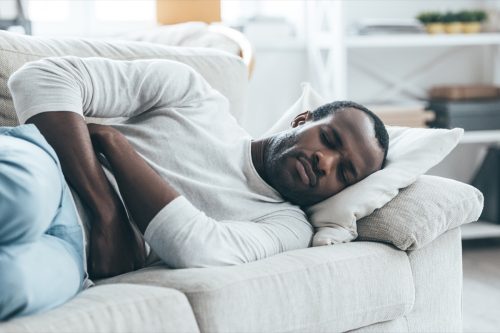
According to Patel, sudden, unexplained nausea or vomiting could be another symptom of a stroke. He explains that both of these symptoms occur “due to a blocked artery or bleeding in the brain.”
3
Hiccups
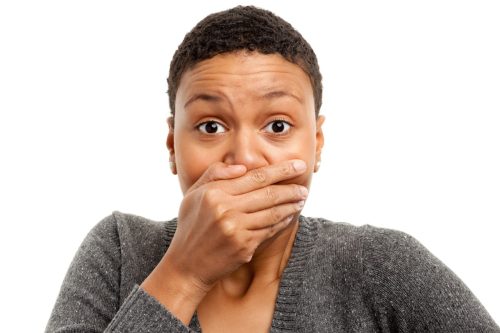
Strangely enough, a stroke can also cause unrelenting hiccups. In fact, as a 2005 paper published in the Journal of Neurology, Neurosurgery & Psychiatry notes, several other neurological issues can also cause hiccups—so even if you don’t think you’re having a stroke, persistent hiccups are worth a trip to the doctor.
READ THIS NEXT: If You Can See This, Your Stroke Risk Skyrockets, Study Says.
4
Dizziness
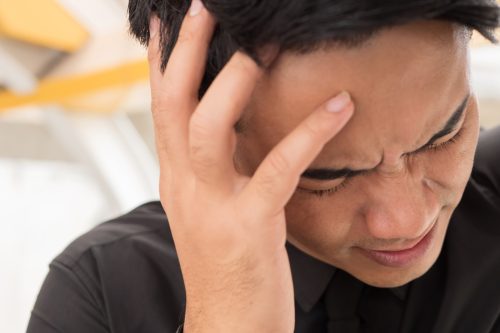
“A stroke in the back of the brain can cause balance difficulty and dizziness,” Jason Tarpley, MD, a stroke neurologist at Providence St. John’s Health Center in California, tells Best Life. If you’re having trouble walking and feeling unsteady, seek medical attention as soon as possible.
5
Chest pain
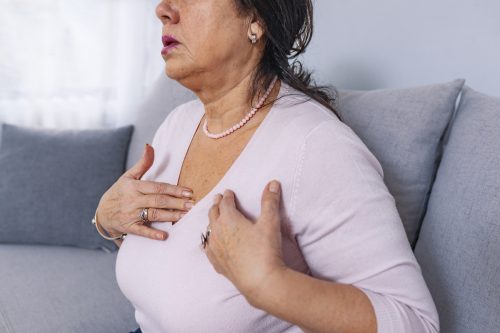
The Cleveland Clinic notes that, “A stroke is your brain’s version of a heart attack.” And in fact, chest pain may be a symptom of a stroke, which is a cardiovascular event. According to Cedars-Sinai, chest pain—especially when it’s accompanied by heart palpitations—can signal an ischemic stroke, which is the most common type of stroke.
6
Shortness of breath
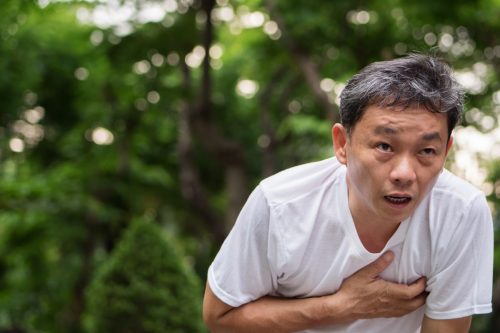
Chest pain isn’t the only stroke symptom that mirrors a heart attack. Cedars-Sinai notes that it’s not uncommon to experience shortness of breath, as well. Strokes and heart attacks are equally serious, so either way, this—as well as all of the symptoms on this list—should be addressed immediately.
7
Confusion

Many people experience a loss of cognitive function as they age—but if you’re dealing with sudden confusion, don’t just chalk it up to getting older. The Mayo Clinic explains that this type of loss of executive functioning—known as vascular dementia—typically occurs when the brain is deprived of blood flow, as it is during a stroke. This symptom doesn’t always manifest as simple confusion, however. For some people, it can mean an inability to read or even difficulty understanding what other people are saying.
8
Memory loss
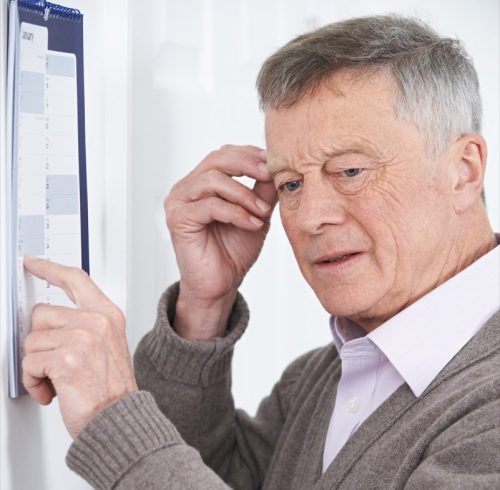
In addition to confusion, strokes can affect the brain in a variety of other serious ways, including some form of memory loss, according to the American Stroke Association, which lists problems with short-term memory, getting lost in familiar places, difficulty following instructions, and trouble making monetary transactions as possible symptoms of a stroke.
9
Numbness or weakness on one side of your body

If you’re experiencing numbness or weakness—specifically only on one side of your body—it’s essential that you get to a doctor as soon as possible. According to the American Stroke Association, single-sided numbness and weakness is a hallmark sign of a stroke. What’s more, it can tell you where the stroke occurred: If your left side becomes weak, the stroke occurred in the right side of your brain, and vice versa.
For more health news sent directly to your inbox, sign up for our daily newsletter.
10
Facial drooping

Facial paralysis or drooping is another classic sign of a stroke, says the American Stroke Association. That’s because when a stroke occurs, it can cause damage to the nerves which control the facial muscles, resulting in a pronounced sagging or lack of movement in the face.
11
Slurred speech

The American Stroke Association also lists slurred speech among the most common and noticeable stroke symptoms. It’s typically caused by muscle weakness following a lack of blood flow to the brain, and may persist even after other stroke symptoms subside.
12
Impaired vision

According to The Stroke Foundation, approximately a third of those who have strokes experience some form of vision loss, ranging from partial loss of sight to complete blindness. Unfortunately, they note, your vision may not fully return to normal following a stroke, though some recovery may happen in the first months following a stroke.
13
Changes in behavior

Strokes often cause changes in behavior, but the specifics of those shifts will depend on which side of the brain the stroke occurred on. As the American Stroke Association notes, strokes on the left side of the brain typically cause “slow, cautious behavior,” while strokes on the right side of the brain result in “quick, inquisitive behavior.” Like slurred speech and vision loss, even after treatment, many of these behavior changes tend to stick around.